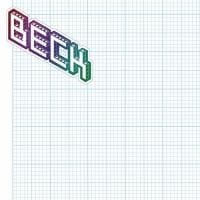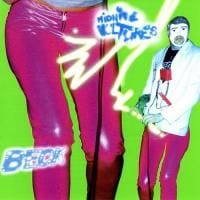When “Loser” broke in 1994, alt-rock was still sorting through the deluge of acts major labels pounced on in the post-Nirvana landscape. If anyone predicted they could tell which acts were going on to lasting careers (e.g. Radiohead, Sheryl Crow) and which acts were destined for footnote ’90s relic status (e.g. Soup Dragons, Candlebox), they were lying.
That’s what made Beck‘s biography so intriguing. On first listen, “Loser” was as much a novelty song as Deadeye Dick’s “New Age Girl”. But repeated listens of his breakthrough album Mellow Gold showed an artist who sounded like he took all of the signature sounds of Los Angeles (punk, Latino-infused rock, hip-hop, and folk) and put them in a slow cooker and turned it on “low” for about 12 hours.
With Odelay, Beck solidified his status as a serious musician without losing an ounce of fun from his earlier tracks like “MTV Makes Me Wanna Smoke Crack”. For about a decade, listeners got a new incarnation of Beck with each release. After Sea Change his albums became more “Beck-like”, as releases like Guero and The Information were less like reinventions and more like revisiting and refining previous sonic experiments. That trend continues with his latest album Morning Phase, released this week. His overall output has yielded two undisputed classics and plenty of “near-classic” material, but even his most uneven works are worth the time and money investment.

10. The Information (2006)
In an interview with the BBC, Beck said making The Information started off as painless and ended up being painful. Taking more than three years to complete, The Information may sound better than his early flurry of albums, but it suffers from bloat (clocking in at over an hour) and despite repeated listens, remains Beck’s least interesting album. Still, within this slog, you’ll find an unexpectedly beautiful string arrangement in “Think I’m in Love”, the great hip-hop tinged track “Cellphone’s Dead”, and the exhilarating percussion-fueled blast of the title track.

9. Morning Phase (2014)
After the pre-release press and hearing a few tracks from Morning Phase, it was hard not to see the album as a sequel to Beck’s 2002 album Sea Change. Still, it’s unfair to immediately lump an artist’s similar-sounding album as a “sequel”. Fortunately, Beck alleviated everyone’s confusion by stating that Morning Phase was a companion piece to Sea Change. Call it his own Harvest Moon.
Morning Phase is packed with the melancholy sounds that enveloped Sea Change, but where that album is awash in heartbreak, a well-earned feeling of contentment populates his newest record. It’s an accessible album, but no singular song immediately grabs you. Instead, the overall mood of Morning Phase promises rewards for patient listeners.

8. Guero (2005)
Guero was the first Beck album that wasn’t a reinvention. Thus, it tended to be slightly derided upon its release as a retread. Hiring the Dust Brothers to co-produce the album didn’t exactly do Beck any favors for this argument. A few songs, like “E-Pro” and the surprisingly limp “Hell Yes” made you wish for a wild, left-field track like “Satan Gave Me a Taco”.
However, almost a decade later, Guero has aged remarkably well. “Girl” is a breezy, late-summer charmer with a gorgeous chorus. “Scarecrow” shuffles and stomps and even throws in a subtle nod to the keyboard/bass introduction to Madonna’s “Like a Virgin”. Listening to it now, Guero goes down as one of the best “artist revisiting past glories” albums since the Beastie Boys’ Ill Communication.

7. One Foot in the Grave (1994)
Mellow Gold may have sounded like either a novelty album or a wonderful chaotic mess, but Beck’s then-cult fanbase knew that his major label debut revealed just a portion of what he was capable of offering. The folk leanings that were evident in some tracks on Mellow Gold are all over the place on One Foot in the Grave.
If Stereophonic Soulmanure (also released in 1994) was the frightening sound of the future of rock, One Foot in the Grave is a 60-year step backward with Beck treading into Alan Lomax territory. This album would later gain notoriety when Tom Petty opted to do a cover of “Asshole”. It may be unfocused, and some tracks borderline on unlistenable (e.g. “I Get Lonesome”), but One Foot in the Grave is one of the best reflections of Beck at the time when he was at his most fearless musically.

6. Modern Guilt (2008)
After the relative bloat of The Information, Beck opted for a “leave the audience wanting more” approach with Modern Guilt, his last album on the Interscope label. Co-produced by Danger Mouse, Modern Guilt is Beck’s leanest album. Tracks like “Gamma Ray” and the title track sound like they could have been recorded for a beach party album in the early ’60s. Beck returning to his Sea Change sound is reason to celebrate, but spending an all-to-brief 30 minutes with Modern Guilt, you hope that this isn’t the final collaboration between Beck and Danger Mouse.
5 – 1

5. Midnight Vultures (1999)
Of course Prince was going to be part of everyone’s Y2K soundtrack on December 31, 1999, but thankfully Beck brought his own party album to the mix that year. Midnight Vultures stands as one of the most cerebral “dumb” party albums ever recorded. “I think we’re going crazy / Her left eye is lazy / She looks so Israeli,” Beck croons on “Nicotine and Gravy”. Of course, with the music as good as it is on Midnight Vultures, you can be excused for not pouring over its lyrical content.
The common summation of Midnight Vultures was that Beck put out the best Prince album since Diamonds and Pearls. And tracks like “Peaches & Cream”, “Milk and Honey”, and the plaintive “Beautiful Way” justified that tag. It may not have shifted the musical landscape like Odelay, but Midnight Vultures did just fine for supplying the party soundtrack for grad school lit and art history majors in the late ’90s.

4. Mellow Gold (1994)
Beck’s first album on a major label was released onto the public shortly before Kurt Cobain killed himself. At first, Beck’s sarcastic, deceptively lazy “Loser” sounded like a crass alt-rock cash grab. And it would sound that way if you just bought the cassette single.
However, those who ended up buying Mellow Gold were treated to a musical landscape that “Loser” only teased at. The folksy “Pay No Mind (Snoozer)” managed to be beautiful on the ears while also forcing listeners to envision a giant dildo crushing the sun. Frightening overheard arguments with apartment neighbors somehow found a home next to tracks like “Beercan” where Beck sets out to be a modern-day Sly & the Family Stone. It’s not a pretty listen, but Mellow Gold ended up avoiding the discount bin that befell many alt-rock artists in that era — and a year after its release, this so-called “destined to be one-hit-wonder” artist ended up on many critics’ “most anticipated follow-up” lists.

3. Mutations (1998)
Only the logic of a major label could have justified not calling Mutations a proper follow-up to Beck’s commercial and artistic smash Odelay. The length (just short of 50 minutes) justifies calling it a full-length album. But more importantly, the songs are anything but tossed-off experiments.
Odelay may have been more of a musician’s album, but Mutations stands as a songwriter’s album. Fans who took to Mutations were the ones who were least surprised when Beck released Sea Change, thanks to confessional tracks like “Nobody’s Fault But My Own” and “Cold Brains”. A consummate fan favorite, Mutations deserves to be mentioned alongside Beck’s more higher profile artistic triumphs.

2. Odelay (1996)
Mellow Gold may be one of the only albums that people bought because of a single, fell out of love with it once that single faded and the backlash began, and thanks to world of mouth, fell back in love with it. So much so that in the summer of 1996, one of the only things the music world was talking about was Beck’s follow-up album.
Odelay lived up to expectations and then some. Fusing Bob Dylan‘s non-sequitur lyrics with Beastie Boys-like production (thanks to the Dust Brothers), Odelay was a confident masterstroke of musicianship. Many music writers credit Odelay with changing the landscape of popular music, but it’s difficult to see how exactly it could have because unlike Nirvana and Pearl Jam, it didn’t seem like any band was willing to try to recreate the formula that Beck perfected on that record.

1. Sea Change (2002)
Classifying an album as “best” or “definitive” may seem like mincing words, but not in the case of comparing Sea Change to Odelay. The later may be the “definitive” Beck album as it had a greater impact on the music world, but the former ekes out a win by the strength of its songs. You can appreciate Odelay‘s ambition while not giving the album a “front-to-back” listen in more than a decade. But Sea Change is that rare album that merits an almost yearly revisit.
The backstory is well-known. Beck recorded Sea Change after breaking up with his longtime girlfriend and fiancee Leigh Limon. While many breakup albums may have reveled in their bitterness, Sea Change was the sound of someone who was first and foremost just trying to make it to the next day. Beck recruited his father (composer David Campbell) to handle the string arrangements, which provided a wonderful, breezy beauty to songs like “Round the Bend” and “Lost Cause”. Deemed a classic almost the day it came out, Sea Change remains Beck’s masterwork and deserves to be on the short list of the best albums released in the early aughts.


![Call for Papers: All Things Reconsidered [MUSIC] May-August 2024](https://www.popmatters.com/wp-content/uploads/2024/04/all-things-reconsidered-call-music-may-2024-720x380.jpg)



